NEWS

13 September 2024
Katalyst is excited to welcome two new Board Members: Human Rights Due Diligence expert Hendrine Stelwagen and University of Amsterdam Professor of Private Law Klaas Hendrik Eller. They each bring extensive experience in sustainability and value chains. Katalyst also thanks our former Board Members Katharine Fortin and Hendrik Lindholm, who have joined Katalyst’s group of Expert Advisors.
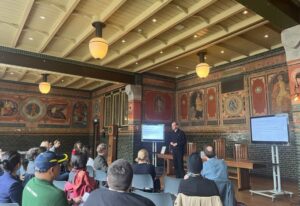
23 May 2024
The University of Amsterdam’s Responsible Business Conduct Lab, led by Luc Fransen, officially launched this week. Katalyst is one of the lab’s partner organisations, and advises on a range of projects including The Evolution of Supply Chain Laws, The Effects of Supply Chain Laws and Present and Future Supply Chain Structures and Responsible Business Conduct Policies. We look forward to working with the lab’s team on these and other exciting research projects!
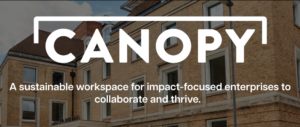
27 February 2024
Katalyst recently joined Canopy at the Cambridge Institute for Sustainability Leadership. Canopy is a community of organisations focused on accelerating solutions to global sustainability challenges. This new home for KI’s connections in the UK compliments our base in Amsterdam, at social change incubator A-Lab. While Katalyst remains headquartered in the Netherlands, we are excited to see our international network continuing to grow in Europe and beyond.
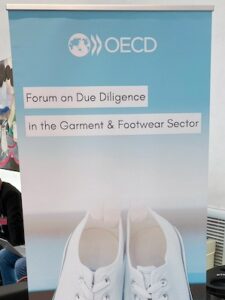
22 February 2024
Katalyst participated this week in the OECD Forum on Due Diligence in the Garment & Footwear sector. This annual gathering is both an opportunity to check in with colleagues in other organisations working to improve supply chains, and to get a sense of where progress is – and is not – being made towards fairer and more sustainable supply chains in the garment industry.
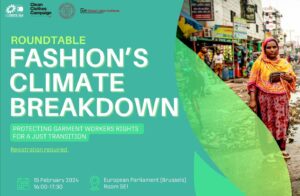
15 February 2024
Katalyst joined our colleagues from Cornell’s Global Labor Institute this week for a series of presentations related to Higher Ground, a groundbreaking report that Katalyst contributed to that highlights heat and flood risks in the garment industry, and the need for climate adaptation. One of the highlights was a roundtable at the European Parliament, co-hosted by MEP Saskia Bricmont and the Clean Clothes Campaign.
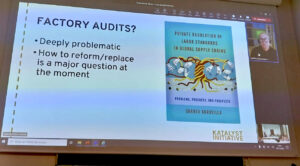
17 November 2023
Katalyst spoke this week with Professor Elena Sychenko’s ESG Compliance class at the University of Bologna, discussing human rights and climate risks in supply chains, and steps that can be taken to address them.

2 November 2023
Katalyst’s Martin Curley was a guest lecturer this week at Cornell University’s Industrial & Labor Relations (ILR) School. He joined Prof. Sarosh Kuruvilla’s class on labour practices in global supply chains & had a great discussion with students on the role of NGOs in trying to secure responsible business conduct.
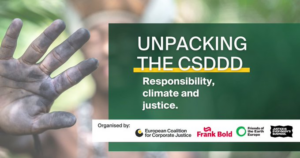
12 October 2023
Katalyst participated in the Unpacking the CSDDD: Responsibility, Climate and Justice workshop today, hosted by ECCJ, FoE and Frank Bold in Brussels. Events like this which help build bridges between the climate and human rights elements of Just Transition work will be increasingly important in the coming years.
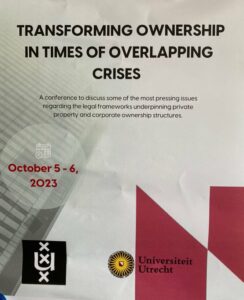
6 October 2023
Katalyst’s Martin Curley joined a fascinating two-day conference on ‘Transforming Ownership in Times of Overlapping Crises‘ hosted by the University of Amsterdam and Utrecht University. A range of experts discussed historical examples and future possibilities for redesigning the ownership structure of companies. Such efforts could help to reduce the negative impact of many current corporate practices, and the growing concentration of ownership in many industries.
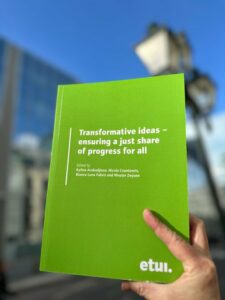
6 October 2023
Katalyst’s Anne Lally joined a wide range of other civil society groups at the European Trade Union Institute’s ‘Transformative Ideas: Ensuring a Just Share of Progress for All’ conference this week. The event brought together a range of viewpoints on how to shape a Just Transition in the coming years.
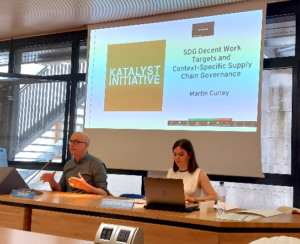
30 June 2023
Katalyst joined an international group of labour lawyers and other experts sharing a wide range of strategies for promoting decent work at the The Added Value of SDG for Labour Rights Protection conference hosted by the University of Trento. We shared some of our research on the importance of understanding supply chain contexts in designing effective governance, and learned about work being done via public procurement, innovative legislation and litigation strategies to protect workers’ rights.

26 May 2023
We were excited to join the workshop ‘Supply Chain Governance in Europe and Beyond’ sponsored by the University of Amsterdam’s Amsterdam Centre for European Studies. An excellent group of academic and civil society participants presented work that pushes the boundaries of current governance thinking. Katalyst’s contribution, ‘Beyond it’s Complicated’ builds on our recent papers, and lays out a number of strategies for moving beyond commonly-heard excuses that have stymied progress on living wages and effective transnational governance.
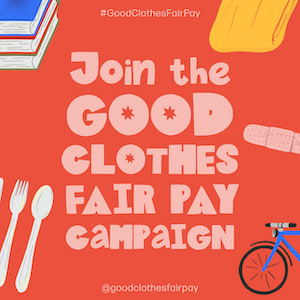
12 May 2023
Our ‘Viewpoint‘ contribution to the Good Clothes Fair Pay legislative proposal has been published. Building on our Trade Realities research, we explore which countries will benefit the most from the proposal and how, combined with good data, it can help create the long-sought-after ‘level playing field’ for living wages.

19 March 2023
We met this week with with Professor Lukas Linsi’s International Relations & International Organization students at the University of Groningen about supply chain governance for human rights. Some great questions and observations from the next generation of policymakers!

16 February 2023
Katalyst participated in the OECD Garment Forum in Paris this week. Great to catch up with our civil society friends and colleagues from around the world in person, in many cases for the first time since before COVID.
Also an opportunity to hear where industry thinking has – and has not – moved on over the last few years, particularly in light of the impending EU Corporate Sustainability Due Diligence Directive.
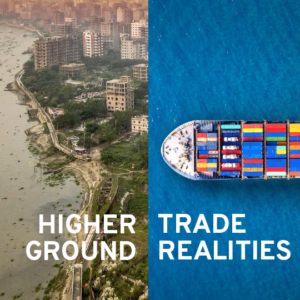
14 February 2023
Higher Ground + Trade Realities OECD Side Session
This official online side session to the OECD Garment Forum brings together the lessons of two new research studies:
Trade Realities is Katalyst Initiative’s new study detailing how trade flows are likely to impact the effectiveness of supply chain governance efforts like HRDD, now and into the future.
Cornell University Global Labour Institute’s forthcoming Higher Ground paper presents original projections of impacts for workers, suppliers and national economies of climate breakdown in four case study production zones in Asia.
Watch the webinar here
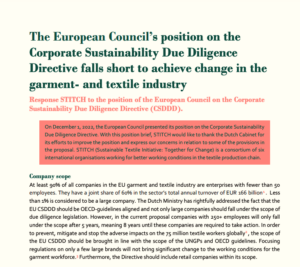
22 December 2022
Katalyst’s research was quoted in the STITCH position paper on the EU Corporate Sustainability Due Diligence Directive, in a discussion about the importance of not limiting scope only to large companies.
The STITCH coalition is supported by the Dutch Foreign Ministry, and includes labour rights organisations CDI in Vietnam and Cividep in India, the Dutch trade unions CNV International and Mondiaal FNV; and MSIs Ethical Trading Initiative UK and Fair Wear.

23 November 2022
Katalyst’s Martin Curley was recently invited to be a guest speaker at Cornell University’s Industrial & Labor Relations School’s ‘Labor Practices in Global Supply Chains’ course.
He joined Professor Sarosh Kuruvilla and students to discuss the role of NGOs in efforts to secure responsible business behaviour and human rights in global supply chains. Topics included the range of strategies employed by NGOs; challenges of shrinking civil society space; the complexities of cooperation across NGOs and between NGOs and trade unions; and the important role NGOs have in speaking truth to power.

11 November 2022
We were greatly saddened to learn of the passing of Klaus Hohenegger, a longtime friend and colleague to many involved with Katalyst Initiative. Our thoughts go out to his family, as we remember his contributions, both personal and professional, to making the world a better place.
Klaus Hohenegger, Managing Director of Sourcing Solutions and Co-founder and Director of Thrive Collaborative, Switzerland, died suddenly of natural causes on 25 October 2022. Klaus was 51 years old.
A native of Austria and a resident of Switzerland, Klaus spent much of his adult life travelling and working abroad. After living and working in Asia in the late 1990s with his wife Angie, Klaus acquired a command of the inner workings of the garment industry from nearly every angle. At companies including KTC (Laos), Eybl International (Romania), Skins and Odlo (Switzerland), Klaus managed garment factories, coordinated brands’ supply chains, and oversaw quality assurance. In his consulting roles since 2010, he worked closely with many brands to upgrade their business practices to align with their values.
A major focus for Klaus was human rights in the workplace. Klaus’ experiences both as a buyer and as a supplier in countless price negotiations (a claim few in the world of human rights due diligence can make) positioned him to create unique, practical solutions to persistent human rights problems – including inadequate wages, forced overtime, and, notably, the low prices that threaten nearly all human rights in global supply chains.
Klaus sparked a series of innovations that would jumpstart brand action on living wages. With his 2011 presentation at the Annual Conference of the Fair Wear Foundation, he shared detailed living wage calculations for a t-shirt, based on his own factory data, and advanced new thinking in the field. In ensuing years, for organisations including Fair Wear, GIZ, ACT and Clean Clothes Campaign, Klaus and his collaborators produced numerous publications, trainings, and pilot projects. Klaus’ co-creations (including the Thrive Methodology, Fact-based Costing, and Klaus’ “baby”, the Fair Price App) are cutting-edge tools with the potential to upend business practices that lie at the root of human rights violations in the garment industry – and with the potential to offer clear benefits to workers around the world.
Yet for those who worked with Klaus, his greatest impact was on us as people. Klaus was not one to shy away from working long hours or diving deep into numbers and concepts. Yet his work ethic never stopped him from connecting with the people around him. Regardless of the seniority, background, age, or experience of the person Klaus worked with, he approached them with openness and curiosity. No question was too basic, despite the depth of his expertise and the range of his creative practicality. Not surprisingly, the most common refrain among his colleagues is: “I’ve learned so much from Klaus.”
Klaus loved a good joke and would find the perfect moment (for example, in the middle of a long presentation) for a funny image to pop up on co-workers’ screens. And during COVID, he would find little moments to delight colleagues’ children who were stuck at home due to lockdowns. An avid sailor, paraglider, SCUBA diver, and skier, Klaus loved the freedom he found in the mountains and the sea. His favourite place to be, however, was always with his wife Angie and three children Sidney, Quentin, and Liam.
Indeed, despite the lasting impact Klaus’ innovations will have on the global garment industry, it is his strong, tight-knit family that is Klaus’ greatest legacy. At this time, our hearts and energies go out to them.
Through all that Klaus gave to us, he will always be present in what we do and how we do it.
In lieu of flowers, Klaus’s close colleagues are organizing a collection to support Klaus’s family at this difficult time. If you would like to learn how to make a contribution in Klaus’ memory, please contact anne@thrive-collab.com.
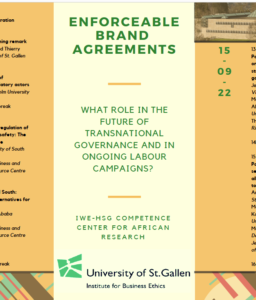
16 September 2022
Katalyst’s Martin Curley shared recent and forthcoming research at the University of St. Gallen’s conference Enforceable Brand Agreements: What role in the Future of Transnational Governance and In Ongoing Labour Campaigns?
Hosted by the Competence Center for African Research at the Institute for Business Ethics, the conference brought together experts from around the world to explore what roles enforceable brand agreements, such as the Bangladesh Accord and Lesotho agreement on gender-based violence and harassment can play in the development of supply chain governance going forwards.
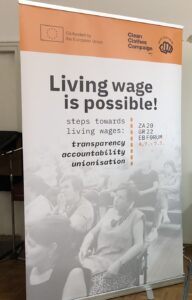
9 July 2022
Katalyst was pleased to be invited to the Clean Clothes Campaign and Novi Sindikat conference Living Wage is Possible in Zagreb.
In addition to participating on the panel “What does due diligence have to do with wages, transparency, gender, and purchasing practices?” Katalyst had a chance to catch up with staff from many trade unions and civil society organisations, and to help identify areas where future research can help answer outstanding questions.
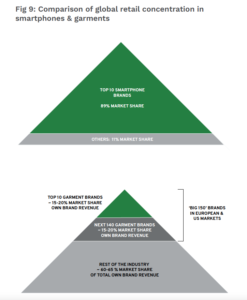
30 June 2022
Katalyst shared the findings from our recent Building Blocks papers with the Cornell ILR New Conversations Project Advisory Board as part of NCP’s 2022 Annual Conference in New York.
It was a fantastic opportunity to discuss the implications of the research with this very experienced group who work with our partners at NCP, and to gain further insights into how future work can be shaped to help support better governance design.
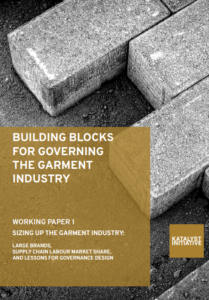
21 February 2022
The first two working papers in Katalyst’s Building Blocks for Governing the Garment Industry series have been published.
Sizing Up the Garment Industry provides analysis to help estimate how many brands would need to change behaviour to reach a critical mass for change in the industry – and what that means for governance design. The companion paper Garment Industry Structure identifies five challenges related to industry structure that we believe governance designers will need to consider as they develop new laws, regulations, collective bargaining systems and other forms of governance.

23 February 2021
Our colleagues at the New Conversations Project at the Cornell ILR School have published the Social Dialogue in the 21st Century report series, designed to provide a root-cause analysis of barriers to impactful social dialogue in 10 major garment-producing countries. Published in cooperation with the Strategic Partnership for Garment Supply Chain Transformation, the reports provide a detailed look at similarities and differences in collective bargaining situations across a significant portion of the garment industry.

16 October 2020
Katalyst was pleased to contribute to the Platform Living Wage Financials Annual Conference, sharing some of our thinking about risk-shifting in supply chains. PLWF is an alliance of 15 financial institutions that encourages and monitors investee companies to address the non-payment of living wages in global supply chains.

10 August 2020
KI’s Martin Curley in Board Agenda on weaknesses in common human rights risk monitoring efforts and what boards need to consider going forwards. Read more here.

20 July 2020
Business & Human Rights Resource Center shared KI’s article on who should define ‘Good’ human rights due diligence. Read more here.

10 July 2020
Katalyst was interviewed for an article in Board Agenda on due diligence in the garment industry. Read the full post here.


